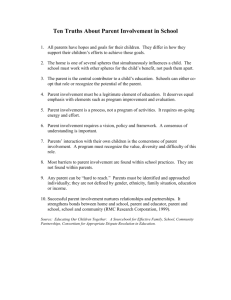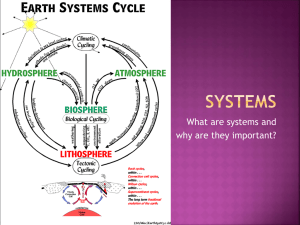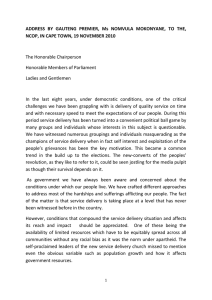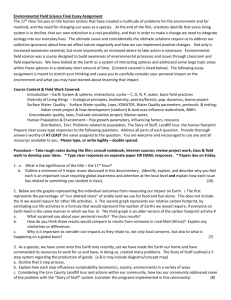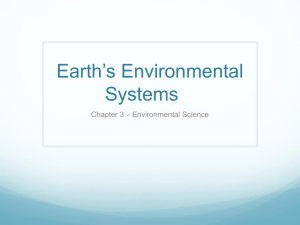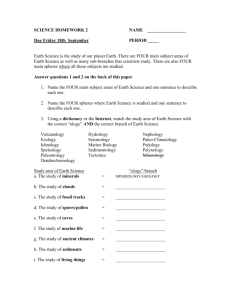Is quality management its own functional discipline?
advertisement
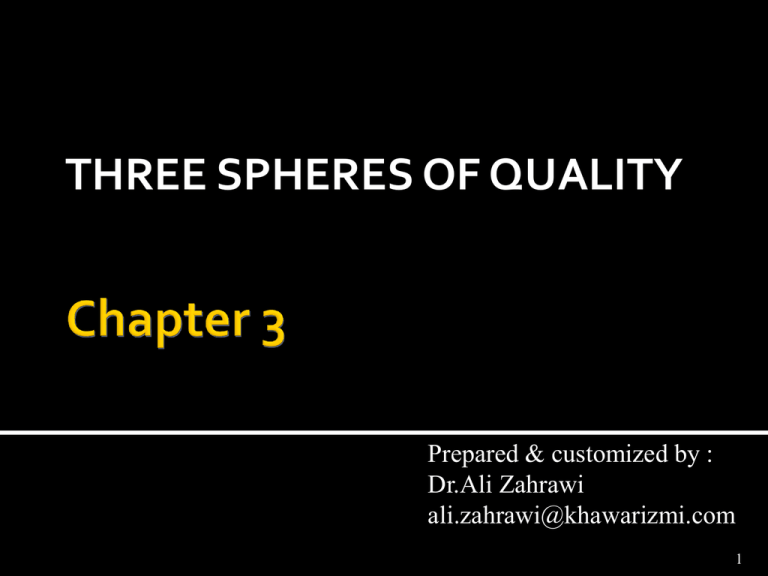
THREE SPHERES OF QUALITY Prepared & customized by : Dr.Ali Zahrawi ali.zahrawi@khawarizmi.com 1 Wall Street Journal reveal job openings for quality managers and engineers. The role of these departments and specialists are changing in the new century of quality. Historically, the quality management department performed a policing function in the firm. Quality managers will responsible for quality conformance and spent their time ferret out causes of defects. Chapter 3 -- Three spheres of Quality 2 In the late 1950s, Armand Feigenbaum and others showed the limitations of this approach. The movement began toward the total involvement of employees spawning total quality management (TQM). With total involvement, the role of the quality department moved from a technical, inspection role to a supportive training and coaching role. Chapter 3 -- Three spheres of Quality3 As a manager or a quality specialist, you will be ask to either arrange or perform quality-related training. The ability to conduct effective training and to facilitate teams are important tools for the quality professional. Is quality management its own functional discipline? Yes and no. Consultants, quality engineers, trainers, coaches, and managers are still needed. A strong knowledge of quality is best coupled with technical experts in other areas such as materials management, finance, accounting, operations management, human resources management, strategy, industrial engineering, or myriad other disciplines. Chapter 3 -- Three spheres of Quality4 One way to conceptualize the field of quality management is known as three spheres of quality. These spheres are quality control, quality assurance, and quality management, and their functions overlap as seen in Figure 5 Chapter 3 -- Three spheres of Quality Quality Management Quality Assurance Quality Control Figure: 3-Sphere of quality 6 Chapter 3 -- Three spheres of Quality Quality Control The control process is based on the scientific methods. Includes phases of analysis, relation, and generalization. Activities relating to quality control include: ▪ ▪ ▪ ▪ ▪ ▪ Monitoring process capability and stability Measuring process performance Reducing process variability Optimizing processes to nominal measures Performing acceptance sampling Developing and maintaining control charts 7 Quality Assurance Refers to activities associated with guaranteeing the quality of a product or service. These activities are design-related. Quality control is reactive rather than proactive by detecting quality problems after they occur. The best way to assure quality is in the design of product, service, and processes. Chapter 3 -- Three spheres of Quality 8 Quality Assurance - Quality assurance activities include tasks such as: ▪ Failure mode and effects analysis ▪ Concurrent engineering ▪ Experimental Design ▪ Process improvements ▪ Design team formation and management ▪ Off-line experimentation ▪ Reliability/durability product testing 9 Quality Management The management processes that overarch and tie together the control and assurance activities make up quality management. Quality Highlight is an example of a company with effective quality management. Quality is the responsibility of all management, not just quality managers. For this reason, a variety of managers, supervisors, and employees are involved in quality management activities such as next slide. 10 Activities of Quality Management Planning for quality improvement Creating a quality organizational culture Providing leadership and support Providing training and retraining Designing an organizational system that reinforces quality ideals Providing employee recognition Facilitating organizational communication Chapter 3 -- Three spheres of Quality 11 1. The Value-Added Perspective on Quality A customer-based perspective 2. Cultural Perspectives on Quality on quality that is utilized by services, manufacturing, and public sector organizations involves the concept of value. Involves a subjective assessment of the the customer. A value-added activity can be pinpointed by asking, “would this activity matter to the customer?” that there are differences in tastes and preferences between cultures and nations. As a result, approaches to quality efficacy of every step of the process for International marketers have long noted - A value-added activity will have economic value to the customer. improvement may differ across culture. It is not so obvious that approaches to quality improvement may differ according to culture. Cultures that are more class-conscious or command-and-control oriented might have trouble delegating decision making to lower levels of employees. Chapter 3 -- Three spheres of Quality 12
